39 draw a free-body diagram for the car.
•Draw a free body diagram, showing all forces and their directions •Write equation of motion and derive transfer function of response x to input u chp3 15. Example 2: Mechanical System chp3 16. Example 3: Two-Mass System •Derive the equation of motion for x 2 as a function of F a. The indicated damping is
A car of mass 1.6 t travels at a constant speed of 72 km/h around a horizontal curved road with radius of curvature 190 m. (Draw a free-body diagram) What is the minimum value of μs between the road and the tyres that will prevent slippage? Solution: Draw the free-body diagram. Looking at the car head on, so that the centre of the circle is
Worksheet #1 Free Body or Force diagrams… Drawing Free-Body Diagrams . Free-body diagrams are diagrams used to show the relative magnitude and direction of all forces acting upon an object in a given situation. A free -body diagram is a special example of the vector diagrams; these diagrams will be used throughout your study of physics.

Draw a free-body diagram for the car.
A free body diagram is a tool used to solve engineering mechanics problems. As the name suggests, the purpose of the diagram is to "free" the body from all other objects and surfaces around it so that it can be studied in isolation. We will also draw in any forces or moments acting on the body, including those forces and moments exerted by the ...
The free body diagram helps you understand and solve static and dynamic problem involving forces. It is a diagram including all forces acting on a given object without the other object in the system. You need to first understand all the forces acting on the object and then represent these force by arrows in the direction of the force to be drawn.
Free Body Diagrams on a Loop‐the‐Loop Roller Coaster Draw the free body diagrams for a coaster at the boom and top of a loop and write the equaons for the net force. mg F net F N F net =ma = ma c The net force in the loop must be centripetal force F net = F N
Draw a free-body diagram for the car..
A car pushes a block across the floor. (assume that it is moving from left to the right) Draw a free body diagram for the car showing: Force by block on car. Force of friction. Force of Gravity. Normal force. Homework Equations The Attempt at a Solution Normal force Straight up, gravity straight down.
Let's apply the problem-solving strategy in drawing a free-body diagram for a sled. In Figure (a), a sled is pulled by force P at an angle of 30∘ 30 ∘. In part (b), we show a free-body diagram for this situation, as described by steps 1 and 2 of the problem-solving strategy. In part (c), we show all forces in terms of their x - and y ...
Draw a free-body diagram. (Neglect air friction) The force of gravity is the only force described. (no air resistance). Problem 8 A car runs out of gas and is coasting down a hill. The car is coasting down the hill, there is dragging friction of the road (left pointing arrow) as well as gravity and normal
Examples of drawing free-body diagrams. To better understand how to draw free-body diagrams using the 3 steps, let's go through several examples. Example 1. A box is pushed up an incline with friction which makes an angle of 20 ° with the horizontal. Let's draw the free-body diagram of the box. The first step is to sketch what is happening:
Summary. This video consists of four sections: a brief refresher on the method for drawing free body diagrams, examples of free body diagrams with an opportunity to practice, examples of situations in which diagrams have been drawn incorrectly (and corrections for them), a final segment that draws connections between free body diagrams and the physical situations they describe.
Draw A Free-body Diagram for the Car. drawing free body diagrams physicsclassroom an example of a free body diagram is shown at the right the free body diagram above depicts four forces acting upon the object objects do not necessarily always have four forces acting upon them there will be cases in which the number of forces depicted by a free body diagram will be one two or three solved draw ...
draw the free body diagram of a car on a banked road and explain which two component of force provides the necessary centripetal force to move in circ - Physics - TopperLearning.com | uj52qhhtt
Draw a free body diagram of all the forces acting on the trailer. Use the force diagram to determine the resultant force on the trailer. Step 1: Draw the force diagram for the car. The question asks us to draw all the forces on the car. This means that we must include horizontal and vertical forces.
Figure 5.32 (a) The free-body diagram for isolated object A. (b) The free-body diagram for isolated object B. Comparing the two drawings, we see that friction acts in the opposite direction in the two figures. Because object A experiences a force that tends to pull it to the right, friction must act to the left. Because object B experiences a component of its weight that pulls it to the left ...
A free-body diagram for the car on the banked turn is shown at left. The banking angle between the road and the horizontal is (theta). The normal force, N, has been resolved into horizontal and vertical components (the blue vectors). In the vertical direction there is no acceleration, and: so:
Draw a free-body diagram; be sure to include the friction of the road that opposes the forward motion of the car. A runner pushes against the track, as shown. (a) Provide a free-body diagram showing all the forces on the runner. ( Hint: Place all forces at the center of his body, and include his weight.)
A 750-kg car accelerates from rest to a speed of 28 ms-1 in 7.0 seconds. Its acceleration is constant and its drive wheels never "slip" on the road. 17. Draw and label a free-body diagram of the car. 17. _See diagram_ 18. Calculate the acceleration of the car. 18. _____ 19. Find the coefficient of friction between the car and the pavement ...
draw a free-body diagram for the car. Ques: Draw a free-body diagram for the car. Draw the force vectors with their tails at the front bumper of the car. The location and orientation of your vectors will be graded. The exact length of your vectors will not be graded. Make sure to include the following: FThrust= Thrust Force. W= Weight. T ...
Learn how to draw the Free Body Diagram(FBD) of a car on a slope. Learn how to draw the Free Body Diagram(FBD) of a car on a slope.
Free Body Diagrams When objects slow down (decelerate), they move in the direction OPPOSITE the net force. Example: A car coasts rightward while slowing down. MOTION F friction F gravity Fnormal Since the car is coasting to the right, there is no force being applied to the right.
A race car of mass . m. travels on a flat circular race track of radius . R. with speed . v. Because of the shape of the car the passing air exerts a downward force . F. L. on the car If we draw the free body diagram for the car we see that the net force along the x -axis is the static friction . f. s. The frictional force. f. s . is the ...
Drawing Free-Body Diagrams Meaning of Net Force Free-body diagrams are diagrams used to show the relative magnitude and direction of all forces acting upon an object in a given situation. A free-body diagram is a special example of the vector diagrams that were discussed in an earlier unit.
A free body diagram models the forces acting on an object. The object or 'body' is usually shown as a box or a dot. The forces are shown as thin arrows pointing away from the centre of the box or ...
A free-body diagram for the car is shown at left. Both the normal force, N (blue components) and the friction force, f (red components) have been resolved into horizontal and vertical components. Notice that the friction force acts up the incline, to keep the car from sliding toward the center of the turn.
To draw a free body diagram, start by sketching a simple representation of the body you want to make the diagram of, like a square to represent a box. Next, draw arrows on the shape that show the forces acting on the object. For example, draw a downward arrow to signify the weight of the object, since gravity pulls the object down.
The free body diagram of a car traveling at a constant speed consists mainly of five forces, when considered in an actual situation. These vectors are that of friction, gravity, normal force, air resistance, and engine driving force.
Physics questions and answers. Part B Draw a free-body diagram for the car. The car is moving to the left. Draw the force vectors with their tails at the dot. The orientation of your vectors will be graded. The exact length of your vectors will not be graded. + add elementvector sum delete element attributes resethelp.
Once again, we apply the general method, starting with a diagram and a free-body diagram in Figure 5.21. We then draw a free-body diagram, which shows an upward normal force and a downward force of gravity. The system can be you or the car - the analysis is the same.
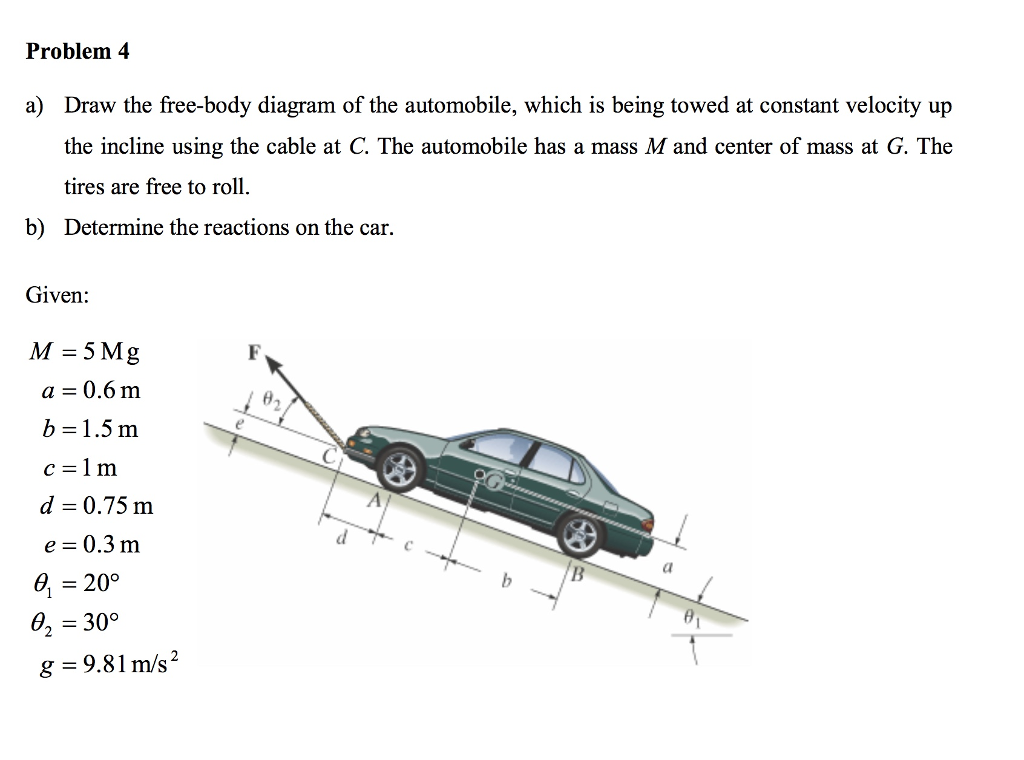




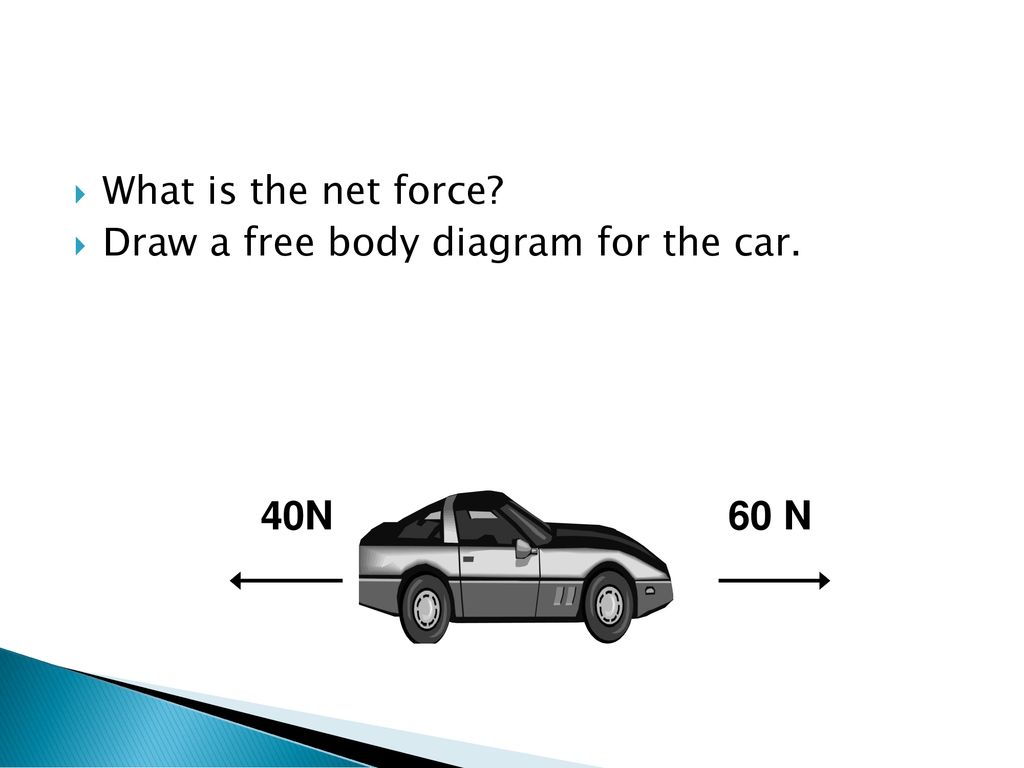



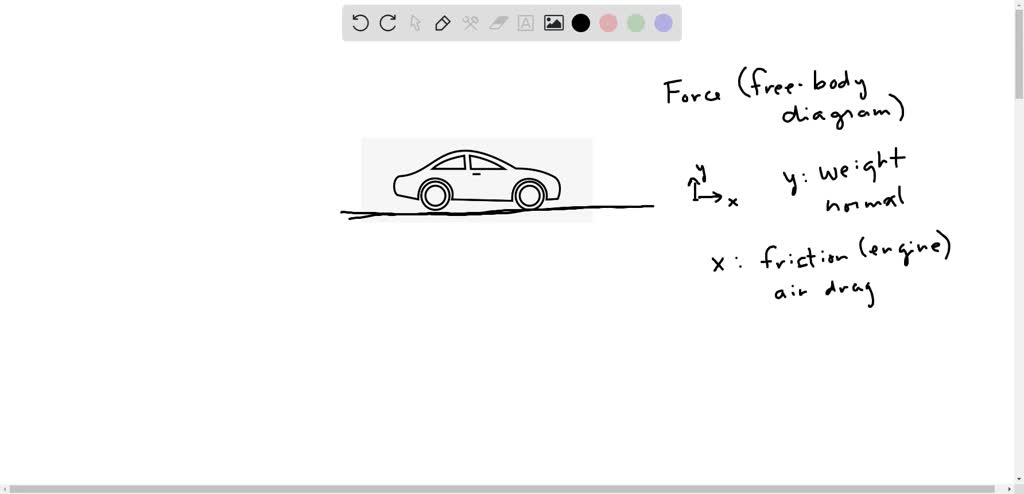

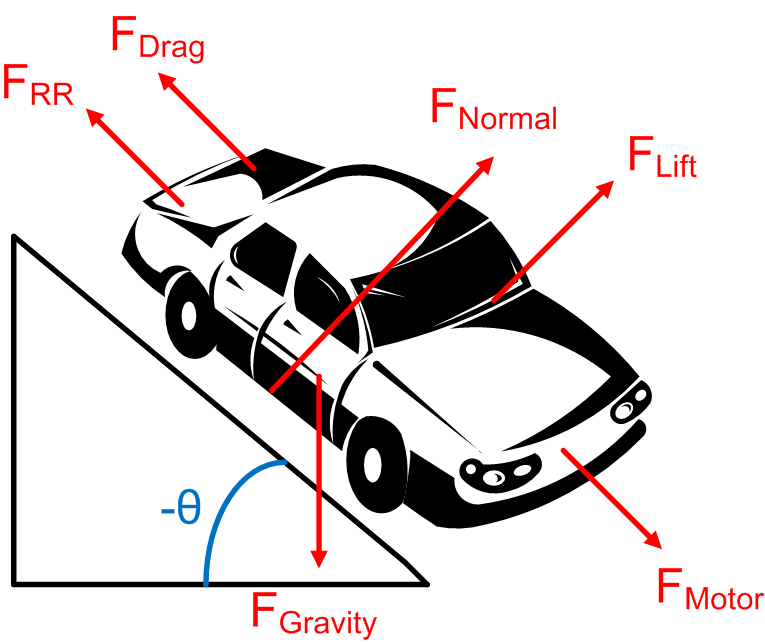



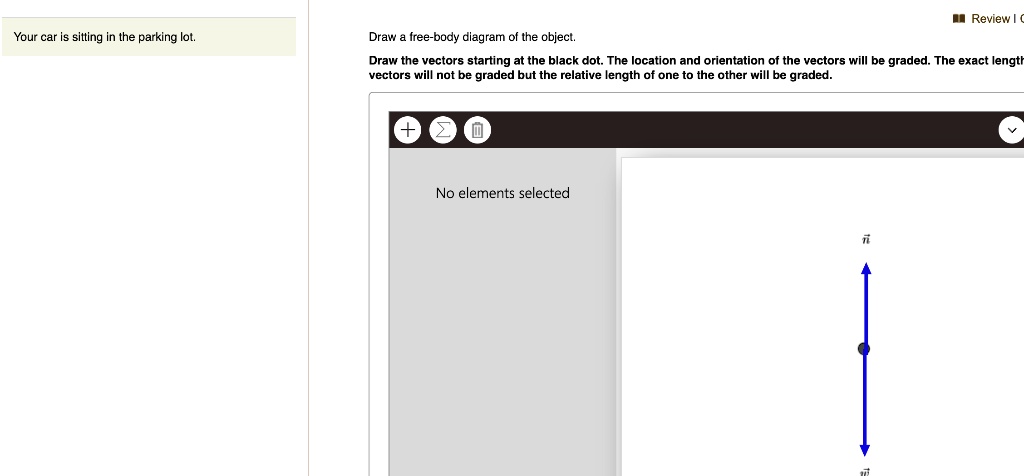
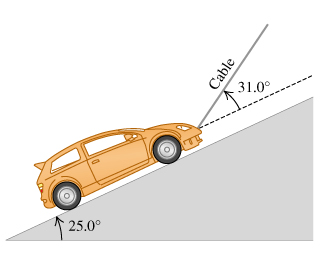
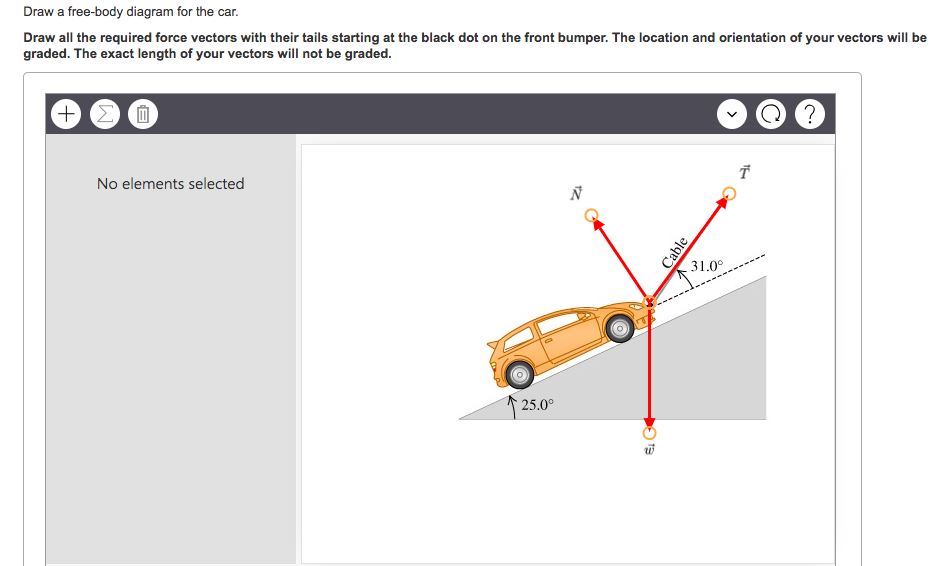




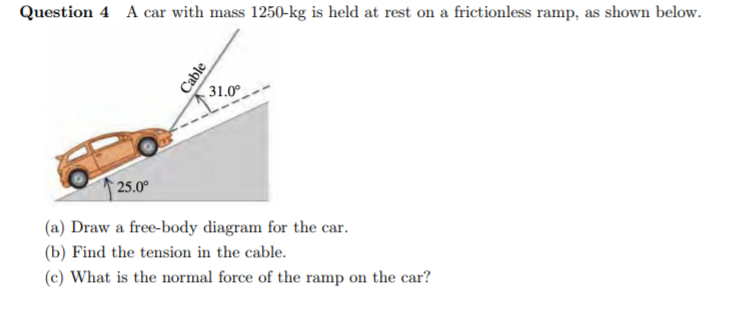

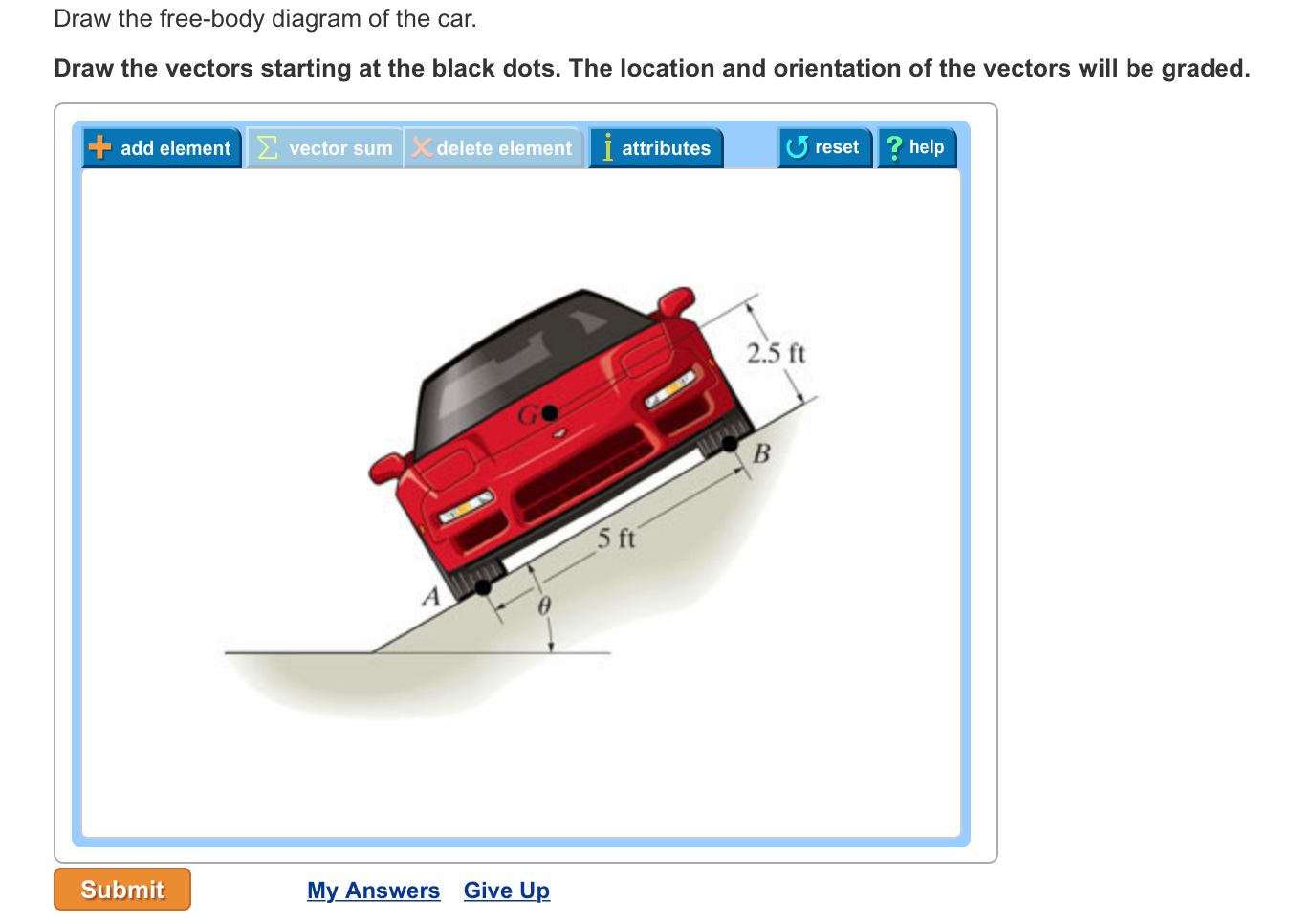
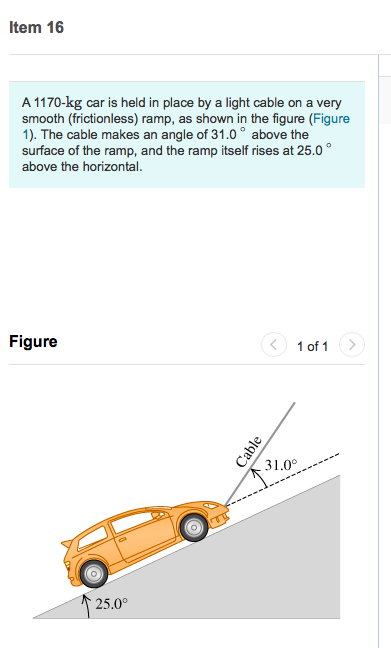




0 Response to "39 draw a free-body diagram for the car."
Post a Comment